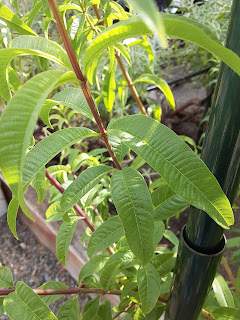 |
Our lemon verbena "tree"
|
Hardly anyone I know is familiar with lemon verbena. It's not a common herb to grow in gardens around here. It's not something I've seen mentioned in any recipes I've come across; as far as I can tell, it's not a "core" herb in cooking. I've never seen it mentioned as an ingredient on any menu or food label. It smells amazingly like lemongrass, a staple in some Asian cuisines that I love for the unique flavor and the strong lemon scent. A whiff of fresh lemon verbena immediately brings to mind the Thai coconut milk soup that I adore. Sadly, I don't think it's interchangeable in the recipe; the flavors of lemongrass and lemon verbena are different. The only way I've seen lemon verbena used commercially is in scented products such as essential oils, lotions, candles, etc. I'm slowly becoming more and more earnest in using as many of our garden plants as possible in our food. I was determined to try and use it for something, especially since it has been our most prolific herb in the garden. The question was, could lemon verbena even be used for something that's not just edible, but delectable? Recently, we did some digging (metaphorically) to find out what is possible.
Turns out that yes, lemon verbena can be used. I found
this site with a whopping 35 ideas on ways to incorporate lemon verbena in food. One of the simplest ways to use it is for a tea. I have never made tea from fresh herbs before (does that make me a tea amateur?); my tea experimentation has been limited to unusual and unique pre-made blends I've purchased. A little more research resulted in a very easy recipe: 1/4 cup of fresh herbs per 1 cup of boiling water, let it steep for a few minutes, then drink. Easy, right? Mom and I were in the mood for a hot cup of tea, so I picked four branches of lemon verbena to try this.
 |
A close-up of lemon verbena leaves
|
I stripped and washed the leaves, ending up with about 1 cup of fresh herbs. I didn't chop or cut the leaves, preferring to leave them whole for this first test. We added the leaves to a teapot, and poured in water we had heated on the stove. After about 3-4 minutes, we poured and sipped the first cup--and our eyes widened. Where has this been all our lives? The flavor is light and fresh, and you definitely get that tone of citrus that you can smell from the fresh leaves. It's even slightly sweet, meaning you don't have to add anything to the tea. Just brew, sip and enjoy. After the success with the hot tea, we decided to try ice tea. It was even better better than the hot tea, in my opinion. The freshness becomes even more pronounced, and adding a little sweetener (a little goes a long way with this tea)
heightens the natural flavors even more, making this a prime candidate
for sweet tea if that's your preferred tea incarnation. In short, if you are a tea drinker, get yourself some fresh lemon verbena tea.
 |
You can see the buds of the flowers coming in here.
These flowers will be trimmed off the plant soon.
|
We grow our lemon verbena in a raised herb bed that is exposed to the ground on the bottom. All of the herbs in this bed can send their roots deep if they want. That area of the yard is southern-facing and gets a lot of sun, meaning the lemon verbena is in full sun a majority of the day. The plant is watered daily, and had been coming in very lush and full this year. I also make sure to trim back the flowers; we do this with most of our herbs we don't harvest flowers from to help the plants concentrate their grow energy into their leaves, the part of these herbs we do use. Our lemon verbena has become more of a bushy tree, so if you're not looking for a plant quite that large, you can grow it in a pot to help control the size.
Lemon verbena surprised us, so much so that we made it the drink of choice when we celebrated July 4th. Give it a try. I bet it'll surprise you too.



No comments:
Post a Comment